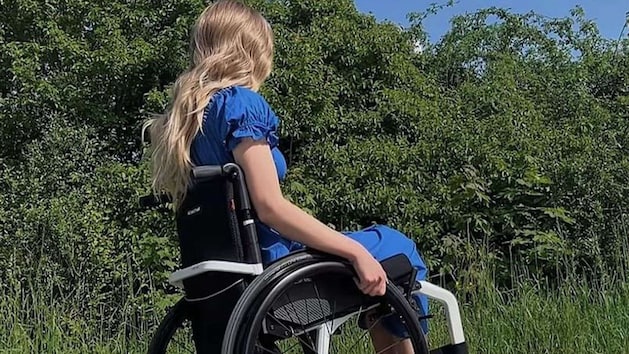Since she was 19, Anouk has been unable to eat without pain without vomiting. Doctors diagnosed Dunbar syndrome. The 25-year-old explains how much it limits her – but she doesn’t give up hope.
If you don’t know her, all you see is a petite young woman with big, bright blue eyes in a wheelchair. Did she have an accident? Or does she have a serious illness? In fact, it is due to an illness that Anouk * is in a wheelchair. For the 25-year-old, however, the wheelchair is more of a liberation than a restriction.
Anouk suffers from a rare disease, Dunbar syndrome. The young woman can walk independently, but after a short time she is so exhausted that she has to rest. She used to be able to leave her apartment on average once a week. Since she got the wheelchair, she has been able to go out twice a week.
It all starts in 2019. Anouk has pain after eating, can’t keep anything down, and is constantly vomiting. This weakens her body. In 2021 she received her first diagnosis: Crohn’s disease. But the illness is rather harmless for her. About nine months later, Wilkie syndrome was diagnosed. She loses a lot of weight.
“Thankfully over the next two years that went away. In some cases, Wilkie syndrome can be cured with an increase. Luckily it worked for me,” says Anouk. During this time she continues to receive nutrition through the vein and additionally high-calorie drinking food. “That worked quite well for me. “As a result, the symptoms went away,” adds the young woman. But the really serious illness for her is Dunbar syndrome.
Dunbar syndrome is a vascular disease or narrowing of the blood vessels. It occurs when a blood vessel in the abdomen that supplies the stomach, liver and other organs with blood and oxygen is narrowed by pressure. “This resulted in my food not coming through properly and me vomiting a lot. I was constantly nauseous, in pain and bloated,” says Anouk.
Because her diaphragm is too low, the blood vessel that transports blood to the stomach and duodenum is bent upwards. The result is a lack of oxygen and nutrients. In addition, the nerves located there are irritated. This leads to circulatory problems, fainting spells, feeling hot, racing heart and heart palpitations. An operation last summer shortly before graduating from high school did not bring the hoped-for cure.
“It’s really difficult to organize my life because I have to lie down most of the day,” she explains. If she stands or sits for too long, she gets worse over time. This can go so far that she can no longer get out of bed. On the other hand, exercise is important to keep your circulation going.
During his Abitur, Anouk therefore received a special arrangement and only had to appear for class tests and exams. Her classmates brought her the learning content back then.
Since then, her everyday life has been such that she spends most of her time “making doctor’s appointments, clarifying things with the health insurance company and trying to somehow move forward and find solutions,” explains Anouk. She also tries, with the help of specialists, to find out whether nerves are still irritated or whether there are other illnesses. “That’s why I’m currently writing to neurosurgeons and Dunbar syndrome experts,” she adds. At the same time, she is trying to find treatment methods that are rarely used in Germany and fatigue therapy – “simply in the hope of finding something that will help me in some way to improve my everyday life,” says Anouk.
The 25-year-old can no longer manage her everyday life alone. She gets help from a nursing service to keep her apartment clean. The nursing service is currently available to her for three hours a month.
She used to enjoy being out and about a lot and often go swimming. “It was actually always my dream to travel around the world after graduating from high school, to see the sea and surf on beautiful beaches. “That’s all been put on hold now,” said Anouk.
The 25-year-old still doesn’t give up hope and makes the best of her situation. She looked for new hobbies. She tries to raise awareness on social media. “That’s also very valuable for me because I feel like I’m doing something and not completely disappeared from life,” says Anouk, adding with a laugh “plus my cooking has gotten better.”
Of course, there are also moments when she is not feeling well mentally. For a long time she was counting on getting healthy again through the operation. “Something has broken inside me since the operation. I also ask myself a lot: What will it be like if I’m sick for another 20 or 30 years? How will this work financially?” Since she is now 25 years old, she is no longer receiving child benefit and maintenance. “I’ve now applied for citizen’s benefit, but it’s possible that I’ll fail,” she explains. Then she will probably end up on welfare.
It was also difficult for the 25-year-old to see her school friends traveling and living life while she was completely somewhere else than she wanted to be at her current age.
Instead, she fights for her health and to find doctors and clinics that can help her. “You are often rejected. It’s just very frustrating when at the same time there isn’t much good happening in life that could outweigh the hard things. That put a lot of strain on me and I struggled with depression at the beginning of the year in particular.”
Sometimes she wishes she had more support and that she didn’t have to do everything alone. Although she has a very good family doctor, when it comes to finding specialists, making appointments and keeping them, she is on her own. “It sometimes feels like a lonely fight for my life,” says Anouk, describing how her operation went. It took place in Hamburg at the time. Originally Anouk was supposed to be picked up and brought back again. But that didn’t work. And because she wasn’t sure whether her health insurance would cover a taxi ride, she took the train. Fresh from the operation, she had to drive home alone with her luggage across Germany. She felt very alone then.
It is therefore particularly important to her that public transport is reliable and barrier-free. Before she sets off, Anouk mentally prepares for her journeys and goes over the routes in her head. But there are factors over which it has no influence. “For example, if the railway goes on strike, I have a problem. There have been times when I’ve had to cancel a doctor’s appointment that I’d been waiting for weeks. Simply because I had no one who could drive me there,” explains Anouk. A taxi is not financially feasible.
She also has to plan a lot when she takes the train. The more often she has to change, the more difficult it becomes. Not all train stations have platforms designed so that she can easily lift her wheelchair onto the train. Some train stations have the option of a ramp, but not all of them.
Another problem is the elevators: If they are out of order, the 25-year-old can’t get anywhere. “I would like the railway to treat such problems as a priority, send a technician immediately and make sure that it is not repaired hours or days later.
Her friends give her strength. “My friends are really worth their weight in gold. I can’t even put into words how great they are. They accept me as I am and always support me.
And how does she look to the future? “It’s very different. I would say, all in all, I am optimistic that I will recover,” says Anouk. She questions whether this attitude is realistic. Above all, however, it is important to accept that she may no longer get well and will have to learn to live with the illness. “It’s hard for me to get there and say, okay, maybe I’ll be sick forever now. Because it always puts a lot of stress on me mentally. But I’m still positive.”
* The real name is known to our editorial team.
Von Gülay Alparslan
After rapid weight loss, a doctor diagnosed Bella Johnston, then 14, with an eating disorder. The young woman suffers from a rare type of cancer that almost costs her life due to the misdiagnosis.
What really makes us happy? Neuroscientist Tobias Esch explains what happiness actually is and which factors influence our sense of happiness. Today, science knows: genes have less influence than thought – and happiness can be trained.
The original for this article “Anouk can’t eat without pain: “A lonely fight for my life”” comes from STUTTGARTER ZEITUNG.









